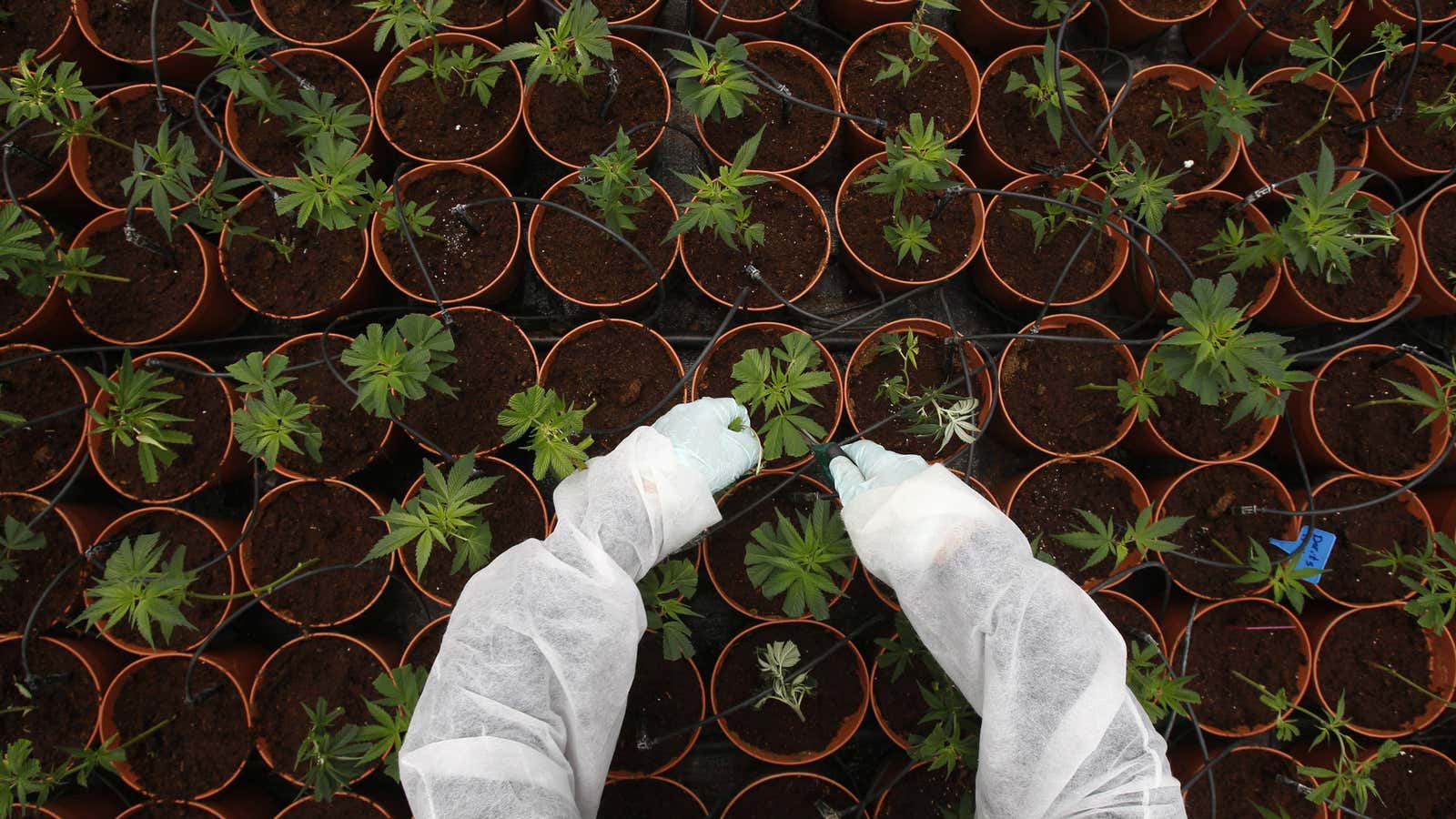Adelanto, California is a dusty desert town just west of Interstate 15. Since the 1992 closure of George Air Force Base (once the area’s main employer), the town has struggled mightily to find a steady source of income.
There was an expensive but failed attempt to build an international passenger airport on the shuttered base. A Chinese-backed venture called Da Zhong Hua Wholesale Town broke ground but faltered. Even the local minor league baseball team turned into a costly burden.
The only industry Adelanto has been able to sustain is incarceration. The city of roughly 31,000 people is now home to three prisons with a total of 3,340 beds. In November 2014, the city council approved construction of a fourth facility, adding another 3,264 beds.
But Adelanto has found a new source of income that could prove far more profitable than prison ever was: legal pot.
Cannabis is at a major crossroads in California, where medical marijuana has been legal since 1996. The state’s marijuana sales—valued at $2.7 billion last year—already account for half the nation’s legal retail weed purchases.
A ballot initiative this November proposes to regulate legal retail sale of recreational marijuana, similar to the laws adopted in Colorado and Washington. If it passes (and it’s expected to), anticipated sales would dwarf even Colorado’s $1 billion legal weed market.
“Every single person involved in this industry sees California as the flagship state,” said Michael Bologna, the CEO and co-founder of Green Lion Partners, a cannabis consulting industry.
In November, Adelanto became the second California city to permit commercial cultivation of medical marijuana. The city has approved 27 permits for growing facilities so far, senior planner Mark de Manincor said. A handful of other cities have since chosen to permit cultivation, primarily in rural areas with few economic opportunities.
Prisons bring Adelanto almost $300,000 in revenue each year, according to de Manincor. Application fees alone for the 27 approved permits to grow medical marijuana have netted almost as much, and that’s not counting still-undetermined fees and taxes.
Desert Hot Springs, another economically depressed southern California desert town, imposed a $25 per-square-foot tax on cannabis plots up to 3,000 feet when it approved legal marijuana cultivation in 2014, with $10 per square foot after.
If Adelanto adopted a similar structure, the city could take in more than $6 million a year, according to one estimate, just from facilities approved thus far. Its total operating budget today is $13 million.
Money is already flooding into California in anticipation of a green-tinted gold rush. Land prices in Adelanto and Desert Hot Springs have tripled. Perceptions of the marijuana industry are shifting away from outdated stereotypes of goofy stoners and shady dealers. It’s bringing in savvy, deep-pocketed investors from around the country who stand to make a tremendous amount of money from an industry emerging from the shadows at an unprecedented pace.
“There is no precedent for such a widely used product moving from a criminal market to a legal and regulated market,” said Troy Dayton, CEO of the ArcView Group, a marijuana-focused investor network. “The closest thing you’ve got is the repeal of alcohol prohibition and the fall of the Berlin Wall. Or maybe even the opening of trade to china.”
Pot as a money-maker hasn’t appealed everywhere. A California law ordered all cities to set up their own medical medical marijuana licensing laws by March 1 or hand over licensing authority to the state. Pot-averse cities interpreted it as their last chance to ban cultivation, with roughly 100 cities and towns outlawing grows altogether.
Communities with little economic opportunity can’t afford to be as choosy. The handful of towns that have permitted cultivation since Adelanto are primarily rural or desert areas with limited industries. Even in pot-friendly Adelanto some residents have been skeptical about the new business strategy, especially given the city’s past history of fiscal mismanagement. As with prisons a generation earlier, many impoverished rural communities may end up reluctantly accepting the infrastructure of an industry that voters support but don’t necessarily want in their backyards.
Like Adelanto, DeBeque, Colorado was a struggling rural town trying to prop up falling oil and gas revenue with a variety of unsuccessful schemes. After the state legalized recreational marijuana in 2012, the town turned itself into a mecca of cannabis retail and cultivation. It collected $340,000 in excise taxes from weed shops last year, according to the LA Times, surpassing its peak earnings from oil and gas.
As one DeBeque businessman told the newspaper, ”We are going to survive by [marijuana] because we sure as hell can’t survive without it.”
